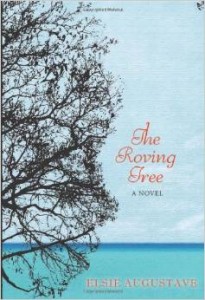Elsie Augustave’s The Roving Tree (Akashic Books/Open Lens, 2013) is a masterful work of fiction, meticulously researched and exquisitely written. Despite the publisher’s statement that it is “told from beyond the grave,” the narrator’s voice is flawless — I kept feeling I was reading creative nonfiction, a book that should share a shelf with Maxine Hong Kingston’s The Woman Warrior, Elizabeth Gilbert’s Eat, Pray, Love, and Maya Angelou’s Letter to My Daughter.
I literally stood up and shook myself to break the spell after the deceased narrator brought the story to a close during the final few pages. My next thought was: This book needs to be taught to university-level humanities students: students of political science, history, sociology, anthropology, comparative religion, African / African-American / Haitian studies, women’s studies — and literature. Above all, literature. Timeless, insightful literature that teaches us about our history, our culture, our social mores, the barriers created by our own unnoticed preconceptions and ingrained prejudices — this book belongs with I Know Why the Caged Bird Sings (Maya Angelou) and To Kill a Mockingbird (Harper Lee).
The Roving Tree begins with the adoption of a very young Haitian girl by a liberal white US family during the Duvalier regime; it is her voice that shares personally-significant moments of her journey growing up as a black child in a white, privileged US family, becoming acquainted with the Haitian refugee-immigrant community in the US through Haitian dance, involvement in the Black Students’ League at university, and reactions (her own and others’) to the appearance of her “white parents” at Black Parents’ Weekend. In the first five chapters, she transitions from a child (to whom things happen) to a university student and active participant in shaping her own destiny — which is, for each of us, when things start to get really interesting.
Chapter Six begins with Iris (the narrator), a junior and an office-holder in the Black Students’ League at her university, welcoming a new black student from Haiti. Iris is eager to engage the new student in the BSL, which she depicts as a supportive community to celebrate students’ shared African heritage. She is also hungry for information and friendship, a connection to her own Haitian origins. Ms. Augustave earned my awe and respect as a writer with this chapter — in three conversations between the two young women (both people of color, both born in Haiti, both attending a US university), in the space of only five pages, the author unveils preconceptions of country, culture, race- and class-relations held by each. And there’s nothing in these five pages that reads awkwardly or seems forced — the interaction and conversation feels completely natural to the reader.
As the book continues, Iris travels to Haiti to meet / reunite with surviving members of her biological family, and later to Zaire in her capacity as a dancer and choreographer. The Roving Tree provides the reader with insight into the social, cultural, religious, and political structures, practices, traditions and tensions in each nation during the time periods depicted. Vaudou, class privilege, political corruption, revolutionary visionaries — the realities of that era in Haiti and Zaire are the backdrop against which Iris grows more and more into herself.
Her own sociocultural preconceptions are depicted with deft subtly; she is able to befriend prostitutes, but cannot bring herself to pay the bribes expected by officials in Zaire (even though such are an integral part of the culture in the area, and might better be termed “advance gratuities”). On the subject of polygamy, legal and traditional, she wavers. Likewise on the practice of vaudou — while she does attend ceremonies and consultations with practitioners, she does not follow the instructions she is given for her own protection and enlightenment.
Those interested in vaudou and Caribbean / African religious traditions should read this book just for the intriguing factual information presented within the fictional context. Those interested in Caribbean and African sociocultural and political history should read it for well-researched background. Women’s studies students should read it for the immense variations of women’s roles presented, and the strong, self-directed, utterly credible narrator’s voice. And as far as an exploration of class consciousness, racial discrimination, and a global search for personal cultural identity, this book is for all of us. Highly recommended.
The Roving Tree may be purchased online here: http://www.amazon.com/Roving-Tree-Elsie-Augustave/dp/1617751650/
–Laura M Kaminski, February 2015

